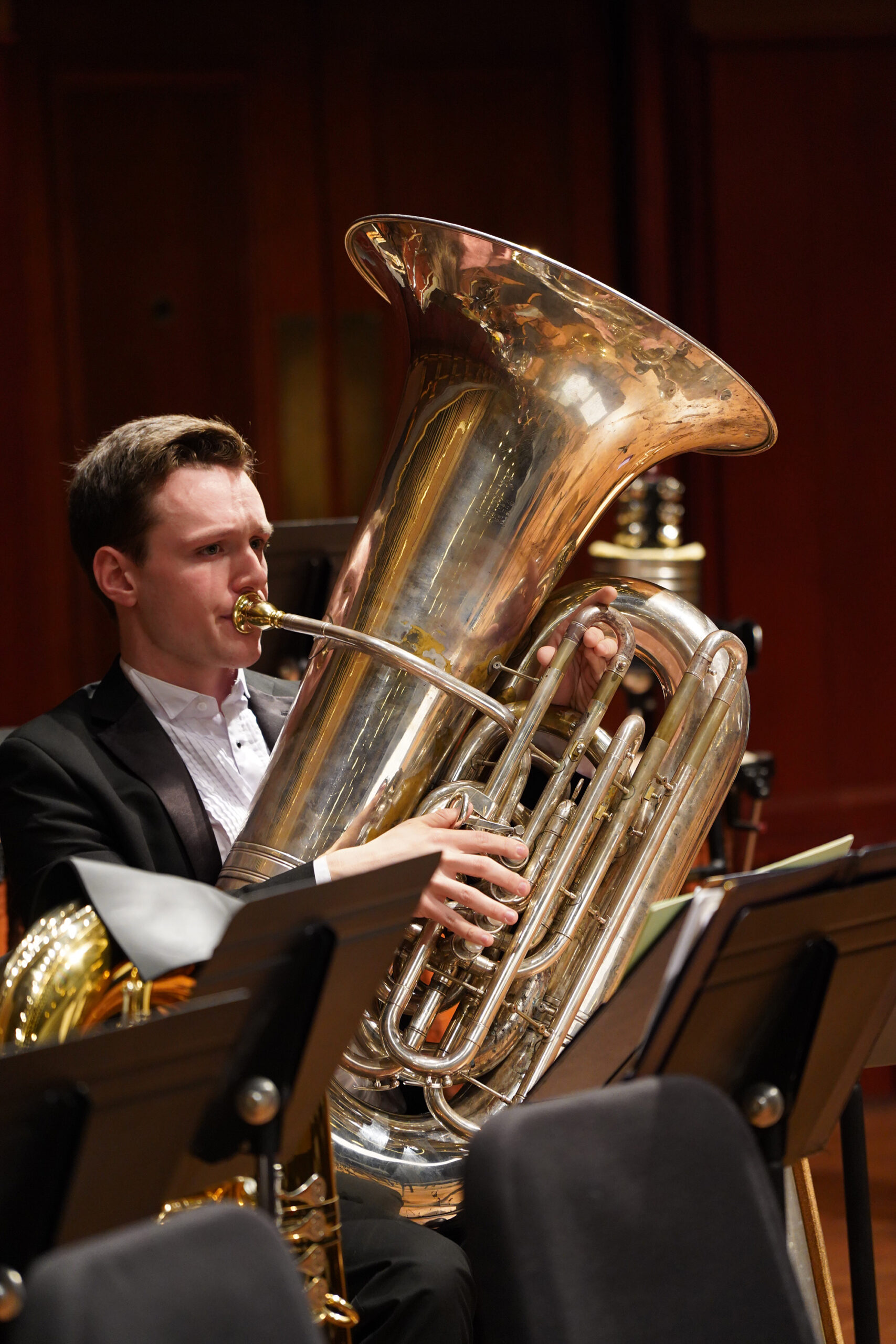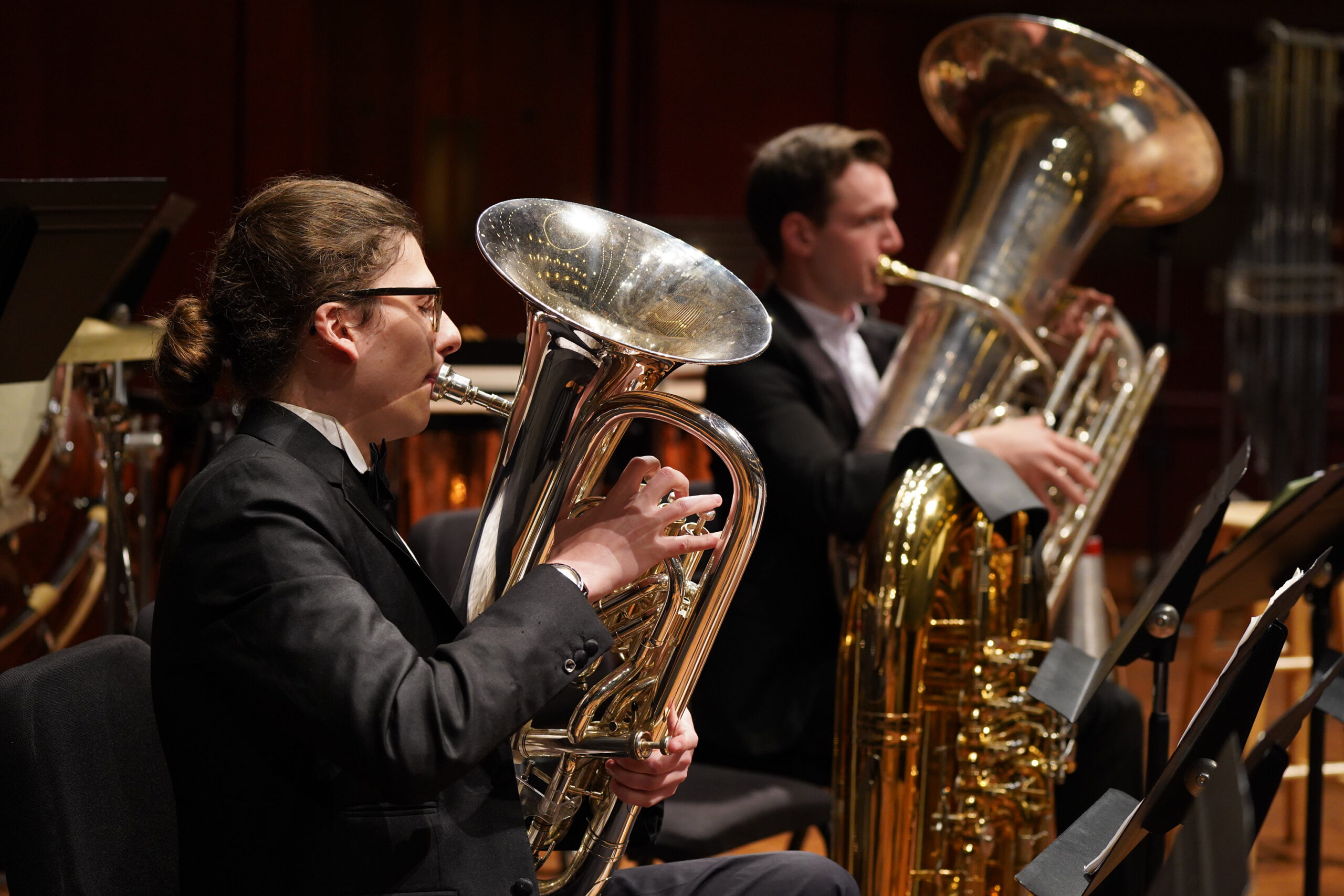Tuba & Euphonium Studio
The musical world is full of diversity and uncertainty, and students will make many career choices upon graduating from the University of Michigan School of Music, Theatre & Dance. Students should graduate as analytical, thoughtful, and competent musicians ready for whatever situation presents itself. As saxophonists and music educators, students will develop a complete, thorough knowledge and competency of the repertoire and pedagogy of the saxophone–which will serve as the foundation for their artistry. It is expected that each student, through lessons, performances, studio class, ensembles, and assignments, strives to reach full musical potential. A student’s development at Michigan is not simply confined to this campus–it is part of a larger musical community, keeping pace with industry standards by engaging in a strict practice regimen, and striving for excellence in musicianship and scholarship.
David Zerkel, Professor of Music, Tuba & Euphonium
Studio/Performance Class
This weekly class is a forum for performance and discussion of tuba-related topics. Its primary purpose is to give students the opportunity to perform for each other and receive feedback from fellow students and Professor Zerkel. The class is also used for presentations and lectures with topics ranging from:
- Technical skills
- Pedagogy
- New music
- Recent and historical recordings
- Career management
Weekly Lessons
Each lesson is graded on the basis of preparation and evidence of one week’s growth in the practice room. Material for lessons will be chosen to suit each student’s needs and respective level. Practice must be consistent and efficient, and the student is expected to spend a minimum of 2.5 to 3 hours a day in the practice room. All students enrolled in lessons must participate in a major, conducted ensemble, such as the U-M Symphony Orchestra or Symphony Band, unless waived for approved reasons.
Lesson books to be chosen from:
- Bordogni Melodious Etudes
- Arban’s
- Kopprasch Etudes
- Etc.

Studio Requirements
- At least two solo performances by undergraduate students, and three by graduate students during a studio performance class. Appropriate accompaniment should be included. Pianists should be requested at least four weeks in advance of a studio or other performance
- Performance of an individually chosen movement(s) from a Bach Cello Suite during the designated studio class(es).
- Satisfaction of the scale requirements during any lesson chosen by each individual student prior to the end of each semester. (Scales listed below) Students may elect to play the entire Bell-Torchinsky Scales during one semester, instead of the required scales for that semester. Unsuccessful scale tests will result in the lowering of the final grade by 1⁄2 letter.
- Satisfaction of jury requirement during finals week; generally, juries are required for second semester freshmen, second semester sophomores (major jury before entire brass faculty), students in the semester before a recital, and those in their final semester of study, unless a recital is performed. MM students are required to perform a jury before advancing to 540, and DMA students should play a jury every semester, except the semester in which the performance preliminary is performed, and thereafter during candidacy.
- A paper on a topic of each student’s choice is required. These are due by the studio class a week before the Thanksgiving break.
- Required recital attendance: in general, any euphonium or tuba recital on campus is required, as are wind faculty recitals. Attendance of large ensemble concerts, faculty and guest recitals by a variety of instrumentalists and singers is encouraged as individual students’ schedules permit. Absences from required recitals for any reason must be cleared with Professor Kaenzig well in advance. More than one unexcused absence will result in the lowering of the final grade by 1/2 letter.
Scales
Students must pass a scale test every semester during their regular lesson time. It can be during the first lesson of the semester, or whenever the student is ready.
Emphasis should be on excellence of tone at all times. There should be no stopping or missed notes. More than 6 missed notes or stops per semester’s requirement will require a re-examination. All scales and arpeggios should be played two octaves (three at your option). Preferred style is notes of equal duration, either slurred or tongued. An option is to play a note of double length at each tonic. If necessary, a quick rhythmic interruption for a breath is acceptable.
Chromatic scales may be asked at typical diatonic scale speed any semester.
FIRST YEAR
Semester 1
- All major and minor (all forms) scales in quarter notes at quarter note = 120
- Corresponding arpeggios
Semester 2
- All major and minor scales in eighth notes at quarter note = 96
- corresponding arpeggios
- fully diminished arpeggios on C and Bb
SECOND YEAR
Semester 1
- All major & minor scales in eighth notes at quarter note = 120
- corresponding arpeggios
- major scales in 3rds in quarter notes at quarter note = 96
- fully diminished arpeggios on C, Bb, G, and F
Semester 2
- All major & minor scales in eighth notes at quarter note = 120
- corresponding arpeggios
- all major and minor scales in thirds; quarter notes at quarter note = 96
- fully diminished arpeggios on C, F, Bb, Eb, G, and D
THIRD YEAR
Semester 1
- All major & minor Scales in eighth notes at = 144
- corresponding arpeggios
- All major and minor scales in thirds in quarter notes at quarter note = 120
Semester 2
- All major & minor Scales in sixteenth notes at quarter note = 96
- corresponding arpeggios
- All major and minor scales in thirds in eighth notes at quarter note = 96
FOURTH YEAR
Semester 1
- All major and minor scales in thirds in eighth notes at quarter note = 120
- third year diatonic scales and arpeggios in sixteenth notes at quarter note = 120
Semester 2
- All major and minor scales in thirds in sixteenth notes at quarter note =7 2
- same diatonic scales and arpeggios
- 12 bar blues in three keys of choice, bass and/or melody lines
GRADUATE STUDENTS
- All undergraduate scale requirements, plus slurred scales in fourths
Juries
Tuba and euphonium students are required to perform a Repertoire Jury for the brass faculty in a non-recital semester and when passing between course numbers. Jury performances are recorded as a final exam for studio lessons.
Jury I (end of Semester I or II)
To pass Jury I, the student must show technical competency in the skills, etudes, and piece and possibly sight-reading. The student must also demonstrate a characteristic tuba and or euphonium tone, careful intonation, musicianship, and control. Control must be shown in areas such as articulation, dynamics, technique, tone and vibrato. In the jury performance, the student must show musical expression and an ability to relate to the accompaniment.
Jury II* (end of Semester IV)
To pass the Jury II, the student must show a maturing knowledge of the instrument. The level of control and musicianship as well as the difficulty of the repertoire should be significantly beyond that required of Jury I. Areas such as intonation. ensemble, flexibility, and musical understanding will begin to take precedence over basic technique. In addition, students must demonstrate competency on the basic skills outlined through YEAR TWO. A performance student that passes the Jury II Repertoire Jury is eligible to perform a junior degree recital the following year as SMTD scheduling/space allows, and will be admitted to junior standing. A music education student who passes Year II juries is eligible to perform a shared or partial non-degree recital as SMTD scheduling/space allows, and will be admitted to junior standing.
*If this jury is failed, a student may be dismissed from the SMTD Tuba and Euphonium Studio.
Jury III (Semester VI or VII)
To pass Jury III, the student should demonstrate a high level of technical facility, a commanding presence and musical conviction. The level of repertoire should be very demanding and should show that the student has complete command of the instrument. An ease of expression and an ability to make the music come “off the page” is what is required to pass Jury III. In addition, the tuba or euphonium student must demonstrate competency on the basic technique skills outlined up through YEAR THREE. This must be done before the musical evaluation, and will be done on a one-on-one basis in the tuba and euphonium studio. A student that passes Jury III is eligible to perform a partial recital or full Degree Recital. The brass faculty will determine the student’s potential to present the Degree Recital during the senior year.
Other
Each semester the student may be given small assignments involving repertoire, recordings, pedagogy, chamber music, orchestral music, or other topics related to the tuba and euphonium. Any assignment will count towards studio participation grade.
University of Michigan Tuba and Euphonium Ensemble (UMETE)
Studio members may participate in a tuba and euphonium ensemble led by Professor Zerkel and doctoral students in the studio. There are usually two performances per semester with an additional side-by-side performance with the Youth Tuba and Euphonium Ensemble (YETE). Members of the larger tuba and euphonium ensemble members are placed into tuba quartets or other smaller chamber music groups to learn a different set of repertoire.
Opportunities for student quartets include UMETE concerts, departmental chamber music recitals, participation in School-sanctioned outreach programs, degree recitals, local and national competitions, regional and national conferences, and more.

